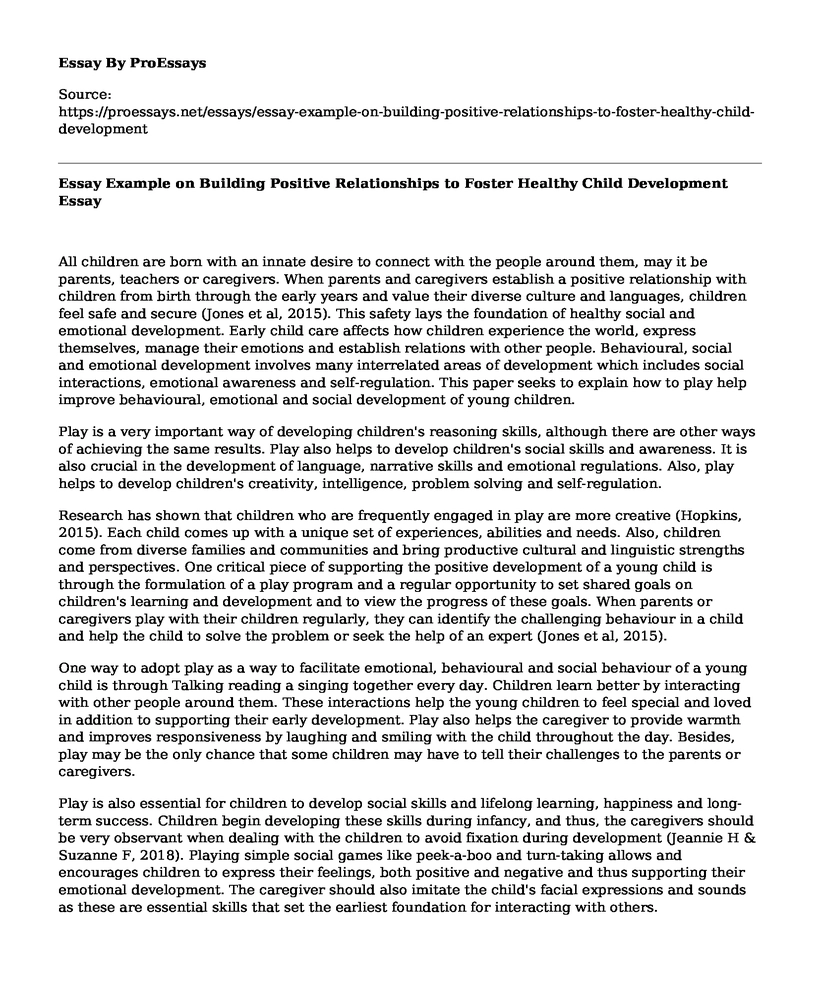All children are born with an innate desire to connect with the people around them, may it be parents, teachers or caregivers. When parents and caregivers establish a positive relationship with children from birth through the early years and value their diverse culture and languages, children feel safe and secure (Jones et al, 2015). This safety lays the foundation of healthy social and emotional development. Early child care affects how children experience the world, express themselves, manage their emotions and establish relations with other people. Behavioural, social and emotional development involves many interrelated areas of development which includes social interactions, emotional awareness and self-regulation. This paper seeks to explain how to play help improve behavioural, emotional and social development of young children.
Play is a very important way of developing children's reasoning skills, although there are other ways of achieving the same results. Play also helps to develop children's social skills and awareness. It is also crucial in the development of language, narrative skills and emotional regulations. Also, play helps to develop children's creativity, intelligence, problem solving and self-regulation.
Research has shown that children who are frequently engaged in play are more creative (Hopkins, 2015). Each child comes up with a unique set of experiences, abilities and needs. Also, children come from diverse families and communities and bring productive cultural and linguistic strengths and perspectives. One critical piece of supporting the positive development of a young child is through the formulation of a play program and a regular opportunity to set shared goals on children's learning and development and to view the progress of these goals. When parents or caregivers play with their children regularly, they can identify the challenging behaviour in a child and help the child to solve the problem or seek the help of an expert (Jones et al, 2015).
One way to adopt play as a way to facilitate emotional, behavioural and social behaviour of a young child is through Talking reading a singing together every day. Children learn better by interacting with other people around them. These interactions help the young children to feel special and loved in addition to supporting their early development. Play also helps the caregiver to provide warmth and improves responsiveness by laughing and smiling with the child throughout the day. Besides, play may be the only chance that some children may have to tell their challenges to the parents or caregivers.
Play is also essential for children to develop social skills and lifelong learning, happiness and long-term success. Children begin developing these skills during infancy, and thus, the caregivers should be very observant when dealing with the children to avoid fixation during development (Jeannie H & Suzanne F, 2018). Playing simple social games like peek-a-boo and turn-taking allows and encourages children to express their feelings, both positive and negative and thus supporting their emotional development. The caregiver should also imitate the child's facial expressions and sounds as these are essential skills that set the earliest foundation for interacting with others.
Conclusion
In conclusion, the parents or the caregiver should provide appropriate toys and books so that the child can explore safely. Children like exploring their environment and this mostly occurs through play. Parents should thus be actively involved in guiding their children through play and setting up space so that they have safety accesses to play materials and to explore independently (Jeannie H & Suzanne F, 2018). Parents should, therefore, provide concrete materials for children play and more so be engaged in guiding the children in play to ensure only desirable behaviour and positive emotions are acquired.
References
Damon E. Jones et al. (2015). Early social, emotional functioning and Public Health: Relationship Between Kindergarten Social Competence and Future Wellness, American Journal of Public Health. https://www2.ed.gov/about/inits/ed/earlylearning/talk-read-sing/feelings-teachers.pdf&sa=u&ved=2ahUKwixov.J
eannie H & Suzanne F, (2018). Promoting Young Children's Social and Emotional Health. https://www.naeyc.org/resources/pubs/yc/mar2018/promoting-social-and-emotional-health
Cite this page
Essay Example on Building Positive Relationships to Foster Healthy Child Development. (2023, Apr 24). Retrieved from https://proessays.net/essays/essay-example-on-building-positive-relationships-to-foster-healthy-child-development
If you are the original author of this essay and no longer wish to have it published on the ProEssays website, please click below to request its removal:
- Joshua's Case About Harassment
- Paper Example on Learning of English as a Second Language
- Ethnic Diversity in the United States Paper Example
- Society's Perception of Gender and the Psychological Effects of this Influence
- How Much Should Freedom Parents Give to Their Children? - Research Paper
- Essay on Student Affairs: Broadening Functional Areas for Student Success
- Paper Example on Civil Rights Movement: Journey to Racial Equality in the US







